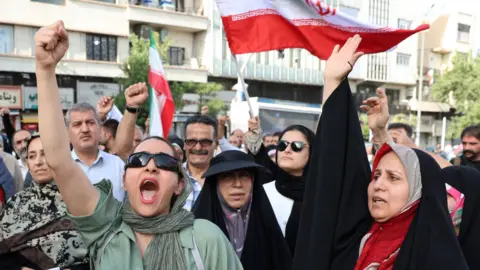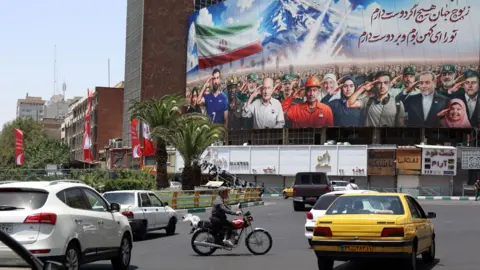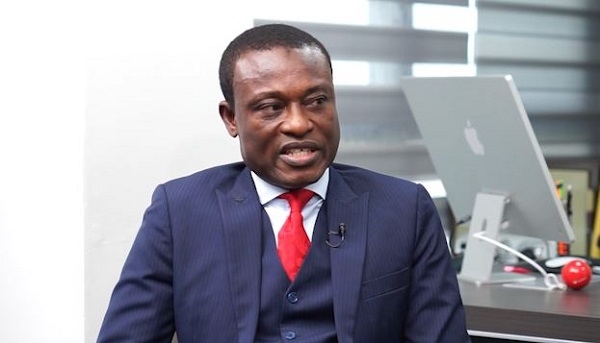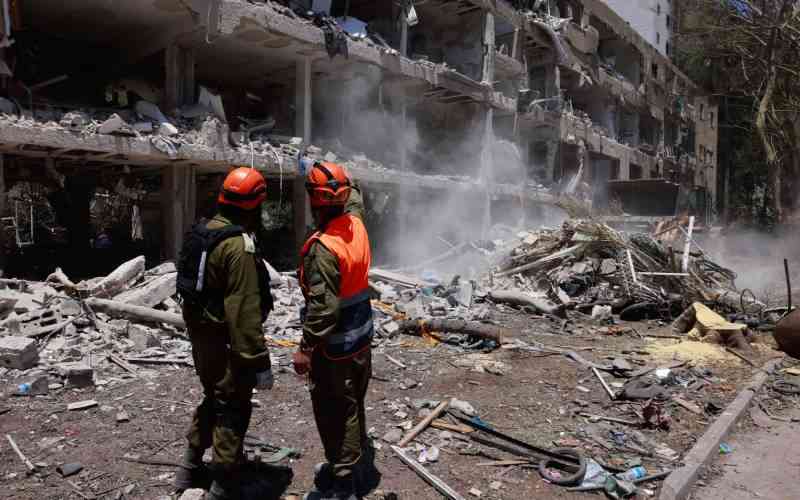Taraneh Fathalian
BBC Persian

 EPA
EPA
"My days and nights are the same. I feel paralysed. I just stare at the ceiling all day and all night."
"I keep wondering what will happen next, and we are constantly caught by surprise."
Shahla - whose name we have changed for her protection - is among the Iranians who have contacted BBC Persian to express their fear and anger after the US bombed three of their country's key nuclear sites overnight.
US President Donald Trump said the Isfahan, Natanz and Fordo facilities were "obliterated" and told Iran's leaders that they now had a choice of "peace or tragedy".
But Iranian Foreign Minister Abbas Araghchi said the US had crossed "a big red line" and warned that it would have "everlasting consequences".
The strikes happened just over a week after Israel launched a large-scale air campaign against Iran, saying it aimed to remove what it called the existential threats of the country's nuclear and ballistic missile programmes.
Iran's health ministry says at least 430 people have been killed so far, although one human rights group has put the death toll at double that.
Iran has responded by launching missiles at Israeli cities, killing 24 people, according to Israeli authorities.
Iran's government has severely restricted access to the internet over the past week, limiting the flow of information about what is happening on the ground and making it harder for families to communicate.
Mehri - also not her real name – was nevertheless able to send BBC Persian an audio message saying how the US strikes had left her upset and angry.
"I don't think I've ever felt this level of sorrow and rage over anything in my life," she said. "But in a way, it also gives me a strange sense of clarity - it reminds me that I'm connected to something beyond myself."
"This war - Iran's war - is essentially a conflict between three individuals. Three leaders, from three countries, driven by their own ideologies," she added, apparently referring to Trump, Israeli Prime Minister Benjamin Netanyahu and Iran's Supreme Leader Ayatollah Ali Khamenei.
"I get furious when I hear them mention names like Isfahan or suddenly declare: 'We've taken control of Iran's skies.' These are not just words to me - they're sacred."
Homayoun, a man from the north-western region of Maku, was defiant in the face of Trump's warning that Iran would face more attacks if it did not agree to peace.
"Yes, we're going through tough times - but we'll stand by our country to the very end. And if needed, we'll give our lives for our homeland, for our honour," he said. "We won't let America and its lackeys make any wrong moves in our country."
Trump warned Iran on Saturday that any retaliation against the US "will be met with force far greater than what was witnessed tonight".
But at a news conference in Turkey on Sunday, Araghchi declared that Iran reserved "all options to defend its security, interests and people". He also said the US bore "full responsibility for the consequences of its actions".
The Islamic Revolution Guard Corps (IRGC) described US bases in the Middle East as "vulnerabilities, not strengths".
Before Israel launched its air campaign, Iran's defence minister had threatened to target all US bases "within our reach" if the US participated in any strikes on its nuclear programme.
Some hardliners also called for US Navy vessels in the Gulf to be targeted and the closure of the Strait of Hormuz, one of the world's most important shipping routes.

 EPA
EPA
Another Iranian man told BBC Persian that he hoped this was "the peak of the war's escalation - and from here, things will start to de-escalate".
"Iran is rational enough to know that any response targeting the US would be complete suicide," he said.
"My child will be born in a few days, and I hope their birth coincides with the birth of a new Iran - one that adopts a fresh approach toward both the international system and its domestic affairs."
"And I hope they grow up knowing that surveillance cameras and security forces should be focused on real threats, not on enforcing the hijab," he added, referring to Iran's strict laws requiring women to wear headscarves which led to mass anti-government protests and a deadly crackdown in 2022.
Another person was critical of the cost of Iran's nuclear ambitions.
"Fordo and Natanz, and the Iranian nuclear programme in general, were the tears of my eyes and the blood of your hearts. They cut the nation's throats for years, and they increased the nuclear budget to build those facilities," they wrote.
Farhad - not his real name - said: "I'm not happy about what happened, but the Islamic Republic's past approach was not bearable. I hope a good future awaits Iran."
At a crossing on Iran's border with Armenia, one young woman who had fled Tehran with her family meanwhile told the BBC she did not support regime change imposed by foreign powers in Iran.
"We were trying to make changes ourselves inside, and I don't think a change coming from US or Israel would be a good change," she said.










